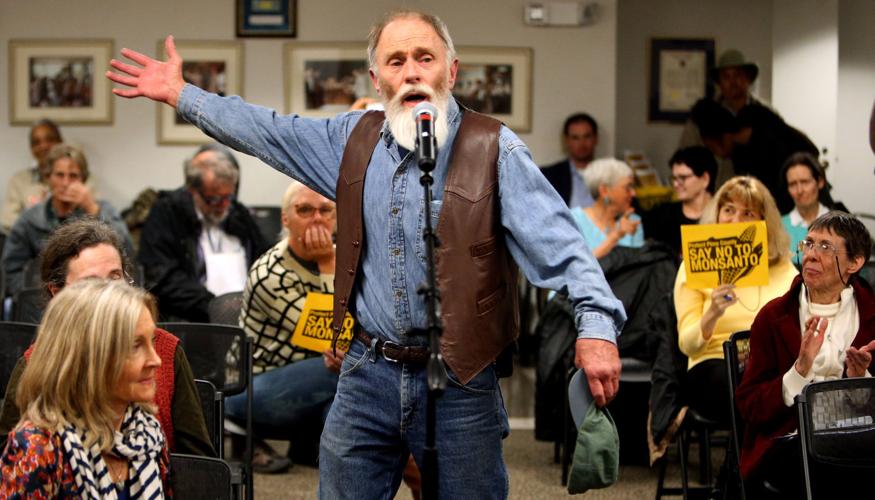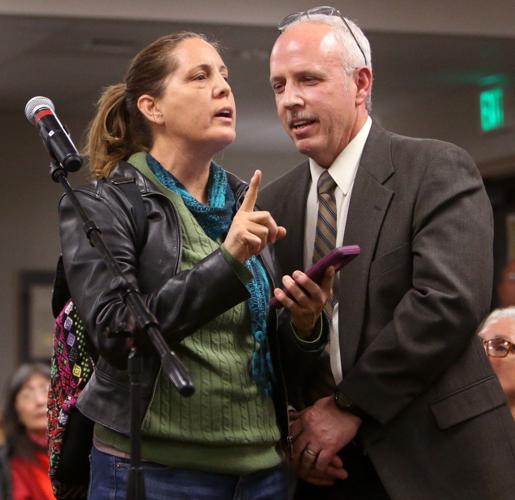Global biotech giant Monsanto Co. has taken a verbal pounding in public meetings on its plan to grow corn in an Avra Valley greenhouse on 7 acres.
More than 100 people, for example, packed a session Wednesday night on Tucson’s west side aimed at providing information and taking public comment on the plan. Also discussed was the company’s request to have the greenhouse included in a federal Foreign Trade Zone that would offer significant property tax breaks. The Pima County Board of Supervisors is scheduled to vote Feb. 21 on whether to support the trade-zone designation for the Monsanto property.
Skeptical members of what at times was a standing-room-only audience grilled a Monsanto official and a Pima County official on many issues. They included the possible use of herbicides at the greenhouse — which the Monsanto official said would be “little or none” — and the amount of tax breaks the company would receive.
“It’s a substantial savings, I’ll tell you that,” said Patrick Cavanaugh, Pima County’s deputy economic development director.
The Monsanto site at Twin Peaks and Sanders roads was billed a total of $1,956 for property taxes in 2015, said a recent memo from County Administrator Chuck Huckelberry.
If Monsanto builds the greenhouse and gets the tax break, its total property tax bill after five years of greenhouse operations would be about $649,000. If the foreign-trade-zone designation ever expired, Monsanto’s bill would rise to $1.445 million.
Questioners asked if the county could stop this project — Cavanaugh said no — and whether Monsanto ever intended to grow more crops in or out of a greenhouse on its total, 155-acre site.
Monsanto’s Amanda McClerren replied it has no such plans, but “I wouldn’t rule it out.”
Wednesday’s meeting was the fourth of five county-run meetings on the Monsanto plan; the final meeting was held Thursday night.
Audience reaction was similar at all of the meetings, officials said.
At Wednesday’s, about 15 people commented, most opposing Monsanto.
Speakers raised concerns about the potential health impacts of Roundup, a Monsanto herbicide; about Monsanto’s pending merger with Bayer, another biotech giant; about impacts of genetically modified organisms used on Monsanto’s seed crops; and about what they see as Monsanto’s incompatibility with the county’s burgeoning sustainable agriculture movement.
At times, speakers grew emotional.
Monsanto’s McClerren said that by using 80 percent less water than a typical outdoor farm and by running a tightly controlled, enclosed environment, the greenhouse operation would be sustainable. That’s the company’s broader goal, said McClerren, who is the lead project strategy official for the greenhouse effort.
She said the company’s efforts here and elsewhere are aimed at meeting growing food-shortage concerns. With the world’s population expected to reach 9.5 billion by 2050, and with protein a growing part of people’s diets, if current agricultural productivity rates continue, by 2050, “we would need another South America to feed the world,” she said.
The company will grow about half conventional and half-GMO crops here, she said, adding that it can grow as much corn in the greenhouse as it could grow outdoors on 192 acres. It will hire 20 to 30 salaried employees and another 30 to 50 employees paid hourly and invest $95 million to $105 million in the greenhouse, McClerren said.
“Sustainability, it’s kind of a fancy word. It’s about growing more with less,” McClerren said, as some crowd members responded, “No respect, no respect.”
She continued, “The greenhouse will allow us to deliver better products to growers faster.”
Fiore Iannacone, a Food Conspiracy board member, read a statement from the food co-op saying, “We stand in solidarity with our community in opposition to Monsanto’s project to develop property in Pima County for the purpose of developing experimental corn. ... We do not approve of Monsanto’s plans, product or ethics. ... Monsanto is a threat to our local agricultural system and is not wanted here.”
Speaker Meredith Skeath noted that Roundup’s main ingredient, glyphosate, has been declared a probable carcinogen by the World Health Organization — a determination Monsanto is formally challenging. She said a major United Nations and World Bank-sponsored report concluded that genetically modified crops have little to offer to fight poverty, hunger and climate change, and that the report championed organic farming “as a sustainable way forward for developing companies.”
“I understand you have no authority to keep Monsanto from doing what it wants. But I raise the ethical question that since our government is entrusted with safeguarding the health of our citizens, that you consider mandatory oversight of a corporation that poses a viable threat to our health and our environment,” Skeath said.
Terisha Driggs, a St. David farmer who supports Monsanto, said she visited company facilities in Hawaii and Brazil and has seen the positive impacts they make on the economy and local communities in general.
“They help build playgrounds. Help employees build housing. They offer scholarships and incentives. They offer grants of $10,000 to $25,000 to schools,” she said.
Driggs encouraged Pima County supervisors to study peer-reviewed journal articles relating to Monsanto.
“I get a tax break because I’m a farmer. It’s the only way we can survive,” Driggs said, although she noted that Monsanto’s tax break would be different from a farmer’s standard agricultural tax reductions.
Supporter Victoria Hermosilla said she thinks that collaborative leadership on this project among Monsanto, Pima County and the University of Arizona will “yield more positive leadership, more positive ideas as we move into the era of uncertainty with climate change.”
Speaker Cynthia Rubiner said she understands from a farmer’s perspective why it’s nice to have this seed and that Monsanto would be using fewer pesticides on these indoor crops. But she also said all her relatives had to get out of farming due to competition from corporate agriculture and that she’s concerned how corporate control affects the biodiversity of seeds.
“Monoculture — we all know Monsanto is contributing to that. Everyone is growing the same seed. We’ve lost 93 percent of our seed diversity. That’s pretty serious,” she said.
Dinah Bear, a private attorney and former general counsel for the U.S. Council on Environmental Quality, urged Pima County to advocate for the federal board that will decide on the foreign trade zone to prepare an environmental assessment under the National Environmental Policy Act.
Federal regulations provide “substantive criteria” that the government uses to make such decisions, she said, including a project’s employment impact, its impact on related industries, and whether it results in a significant public benefit.







